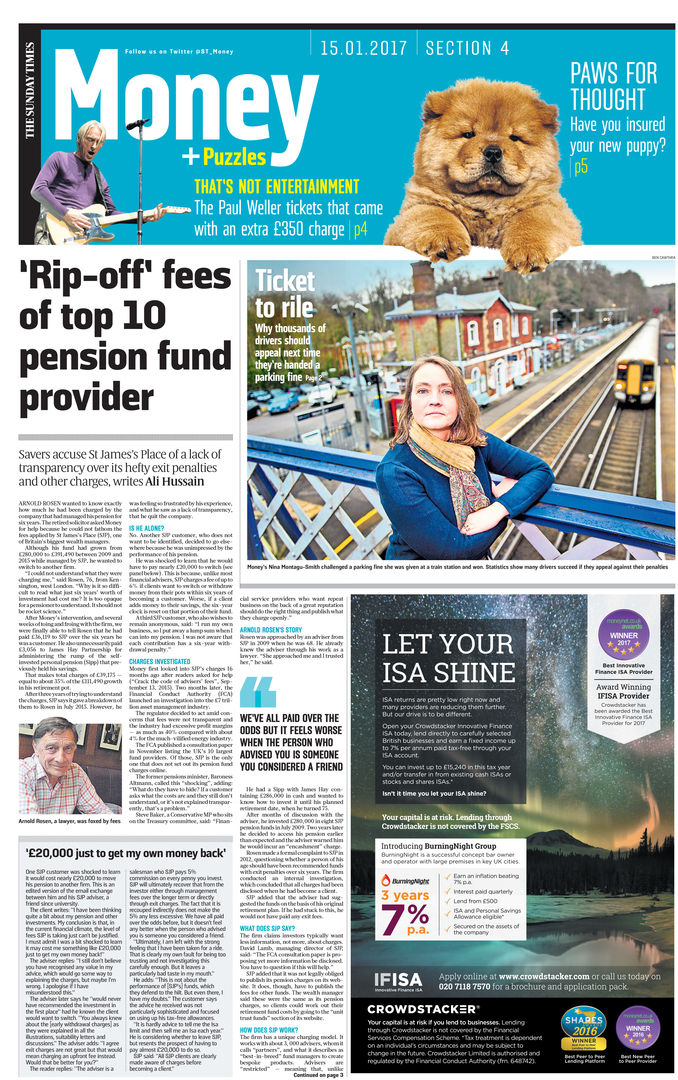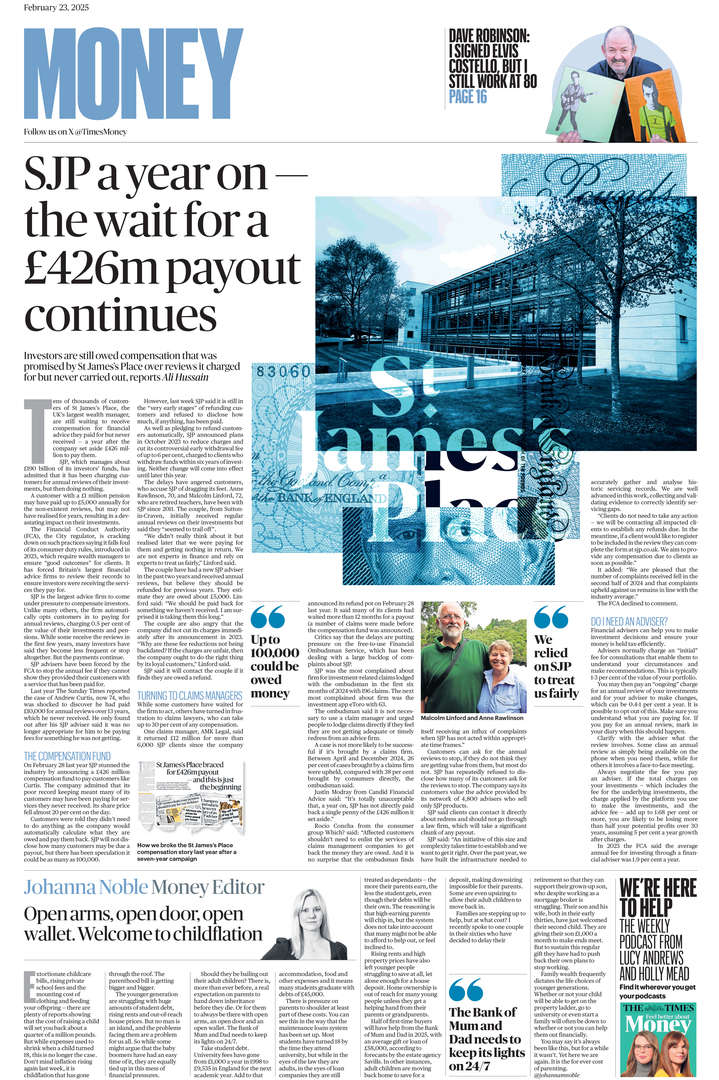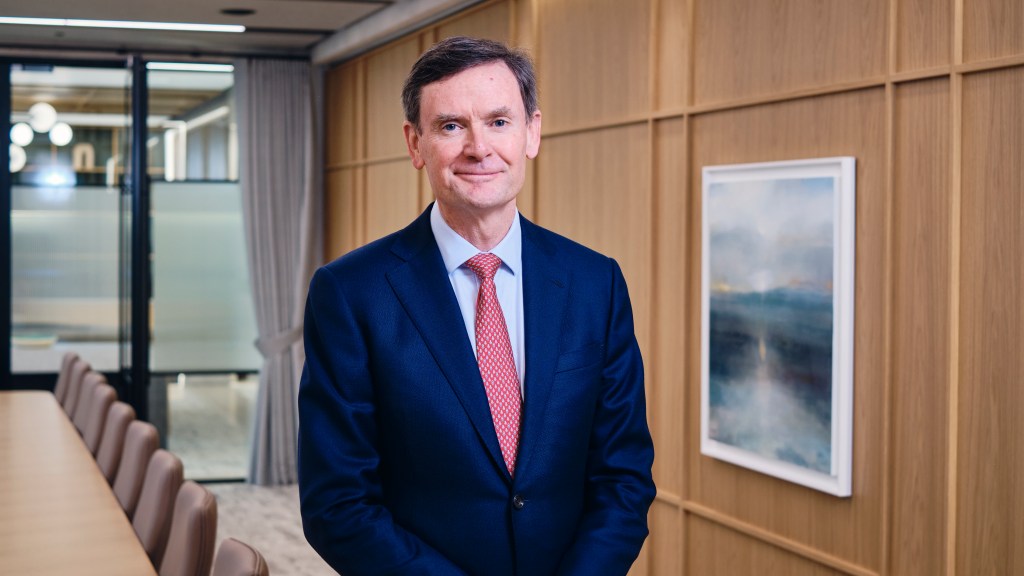St James’s Place Reforms Its Fee Structure and Aims for Transparency
In a shift from past conflicts, St James’s Place (SJP), the largest wealth management firm in the UK, is striving for a more open approach regarding its fees after being accused of imposing “rip-off” charges back in 2017. The company threatened legal action at the time, but we continued to challenge their practices.
Now, I find myself discussing matters with SJP’s current chief executive, Mark FitzPatrick, who assumed the role in December 2023. Unlike previous meetings, this time I received an invitation to their Paddington office for a chat over tea.
FitzPatrick, who has experience as an SJP client, stepped into his position shortly after the firm announced substantial changes to its fee structure, which include setting aside funds for compensating clients for undeserved advice fees.

SJP, managing approximately £190 billion for nearly one million customers, reacted to increasing regulatory pressure from the Financial Conduct Authority (FCA). This resulted in fundamental changes to its fee policies, marking a pivotal moment after persistent critiques from The Sunday Times regarding the firm’s pricing.
FitzPatrick openly admits to past errors, stating, “If you address those issues, the opportunity is vast,” referring to the benefits of adopting a clearer, more honest pricing model.
Key Changes in Fees
One of the most notable aspects of SJP’s revised fee structure is the elimination of the charge of up to 6% on early pension withdrawals.
Although regulator-imposed caps limited exit fees to 1%, SJP previously avoided these regulations by labeling its fees as “early withdrawal charges.” This practice is now being phased out.
To counterbalance potential revenue losses, SJP is introducing a charge of up to 3% for initial pension advice—previously free—and increasing annual advice fees from 0.5% to 0.8%.
For the first time, SJP will delineate the costs associated with managed funds, investment platforms, and advice separately, allowing clients to make direct comparisons with competing firms.
Regarding the timeline for these changes, a leaked presentation indicated a potential implementation date of May 27, but the firm has since softened its stance to a broader “by summer” timeframe.
“Our IT isn’t ready yet,” FitzPatrick acknowledge, adding, “We aim to have it completed by the end of summer, which we consider to be the end of August.”
Clients will receive two cost illustrations a month prior to the new fee structure’s rollout, ensuring they are well-informed. FitzPatrick emphasized the importance of transparency, stating, “I want clients to know that if they had all the information, they wouldn’t feel they should have waited.”
Addressing Past Issues
Last year, SJP committed to compensating clients with £426 million for annual reviews that never occurred. This publication has often reported on the dissatisfaction of clients who could not connect with their advisers, known as “partners.”
FitzPatrick acknowledged past deficiencies in the company’s monitoring of partner-client interactions, stating, “We didn’t have a system that provided comprehensive oversight of all partnerships or a clear view of all client interactions.”

SJP had used “spot checks” on a sample of advisers, whereas the new system will allow the firm to monitor all partners’ records, enabling compliance teams to detect issues proactively. FitzPatrick explained, “We can track advisers’ engagement with clients better now and ensure they reach out to those who haven’t been contacted in months.”
If partners don’t comply with the new documentation protocols, FitzPatrick warned, they risk losing monetary compensation, stressing the necessity of proper record-keeping.
Despite previous issues with advice accessibility, only 2% of clients—about 20,000—have opted out of annual portfolio reviews, a right established for advised investors since 2012.
While not all clients may require annual reviews, FitzPatrick highlighted their comfort in knowing an adviser is available when needed, noting, “Clients often express that while they don’t need frequent contact, they appreciate having an adviser on call, and they are willing to pay for that assurance.”
This sentiment is reflected in positive client engagement, with total new investments with SJP rising from £3.97 billion in Q1 2024 to £5.14 billion in the same quarter this year.
Assessing Performance
A recent value assessment report by SJP, which is mandatory for all fund managers to validate their fees, indicated that of 45 funds reviewed, 32 provided overall value, including customer service. However, only four funds were recognized for their performance, with two not yet assessed due to their newness.
FitzPatrick pointed out that the way fund performance is reported can be misleading, as it includes advisory fees, complicating direct comparisons with other funds. The revised fee structure aims to facilitate more straightforward, accurate comparisons and showcase SJP’s fund performance more favorably against competitors.
When asked about the value of advice, FitzPatrick stated, “Investment returns matter significantly, but the narrative of advice extends beyond investment alone.” He elaborated that poor tax planning or untimely retirement decisions could diminish strong investment performance.
He added, “When returns are not satisfactory, we must acknowledge that and clarify our strategies for improvement.”
Regarding the excessive incentives previously awarded to SJP’s top sellers, FitzPatrick confirmed such practices have ended. Current successful partners now participate in “team-building events,” allowing them to connect, learn from peers, and enjoy shared experiences.
The previously criticized “rip-off” charges are progressively being restructured, promoting a pricing model that aims for enhanced transparency and fairness.




Post Comment